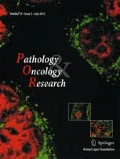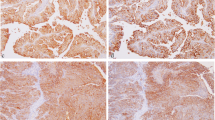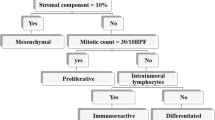Abstract
The aim of this study was to investigate the association between the clinicopathologic factors and either expression or co-expression of mesothelin and cancer antigen (CA) 125 in endometrial serous carcinoma and mixed carcinomas including serous carcinoma. Between 1990 and 2017, patients with endometrial serous carcinoma and mixed carcinoma including serous carcinoma treated by total hysterectomy and bilateral salpingo-oophorectomy at our hospital were identified. The association between either expression or co-expression of mesothelin and CA125 was evaluated by immunochemical analysis and the clinico-pathological features were retrospectively examined. Among the 40 patients included, 19, 31, and 18 patients exhibited single positive mesothelin, single positive CA125, and positive co-expression, respectively. The expression of mesothelin and CA125 was observed to be positively associated (p = 0.021). There was no significant association of age and FIGO stage with individual mesothelin or CA125 expression or their co-expression. Overall survival (OS), but not progression-free survivals (PFS), of only mesothelin-positive patients was worse (p = 0.024). Hence, OS and PFS of patients with positive co-expression were worse (PFS: p = 0.043, OS: p = 0.012). In multivariate analysis, single mesothelin expression and single CA125 expression did not lead to worse prognosis. However, positive co-expression was the worst prognostic factor for OS (hazard ratio: 3.32, p = 0.039). Co-expression of mesothelin and CA125 may accurately predict OS in endometrial serous carcinoma and mixed carcinomas including serous carcinoma. Further studies should examine this relationship.


Similar content being viewed by others
Data Availability
The datasets generated and/or analyzed during the current study are available from the corresponding author on reasonable request.
References
Wartko P, Sherman ME, Yang HP, Felix AS, Brinton LA, Trabert B (2013) Recent changes in endometrial cancer trends among menopausal age US women. Cancer Epidemiol 37:374–377
Bokhman JV, Chepick OF, Volkova AT, Vishnevsky AS (1981) Adjuvant hormone therapy of primary endometrial carcinoma with oxyprogesterone caproate. Gynecol Oncol 11:371–378
Wright JD, Medel NB, Sehouli J, Fujiwara K, Herzog TJ (2012) Contemporary management of endometrial cancer. Lancet 379:1352–1360
Tashiro H, Isacson C, Levine R, Kurman RJ, Cho KR, Hedrick L (1997) p53 gene mutations are common in uterine serous carcinoma and occur early in their pathogenesis. Am J Pathol 150:177–185
Hendrickson M, Ross J, Eifel P, Martinez A, Kempson R (1982) Uterine papillary serous carcinoma: a highly malignant form of endometrial carcinoma. Am J Surg Pathol 6:93–108
Fader AN, Starks D, Gehrig PA, Secord AA, Frasure HE, O’Malley DM, Tuller ER, Rose PG, Havrilesky LJ, Moore KN, Huh WK, Axtell AE, Kelley JL, Zanotti KM (2009) UPSC consortium. An updated clinicopathologic study of early-stage uterine papillary serous carcinoma (UPSC). Gynecol Oncol 115:244–248
Faratian D, Stillie A, Busby-Earle RM, Cowie VJ, Monaghan H (2006) A review of the pathology and management of uterine papillary serous carcinoma and correlation with outcome. Int J Gynecol Cancer 16:972–978
Miyamoto M, Takano M, Tsuda H, Soyama H, Aoyama T, Ishibashi H, Kato K, Iwahashi H, Matuura H, Yoshikawa T, Suzuki A, Hirata J, Furuya K (2017) Small foci of serous component as a predictor of recurrence and prognosis for stage IA endometrial carcinomas. Oncology. 93:29–35
Chang K, Pastan I, Willingham MC (1992) Isolation and characterization of a monoclonal antibody, K1, reactive with ovarian cancers and normal mesothelium. Int J Cancer 50:373–381
Chang K, Pastan I (1996) Molecular cloning of mesothelin, a differentiation antigen present on mesothelium, mesotheliomas, and ovarian cancers. Proc Natl Acad Sci U S A 93:136–140
Morello A, Sadelain M, Adusumilli P (2016) Mesothelin-targeted CARs: driving T cells to solid tumors. Cancer Discov 6:133–146
Dainty LA, Risinger JI, Morrison C, Chandramouli GVR, Bidus MA, Zahn C, Rose GS, Fowler J, Berchuck A, Maxwell GL (2007) Overexpression of folate binding protein and mesothelin are associated with uterine serous carcinoma. Gynecol Oncol 105:563–570
Kachala SS, Bograd AJ, Villena-Vargas J, Suzuki K, Servais EL, Kadota K, Chou J, Sima CS, Vertes E, Rusch VW, Travis WD, Sadelain M, Adusumilli PS (2014) Mesothelin overexpression is a marker of tumor aggressiveness and is associated with reduced recurrence-free and overall survival in early stage lung adenocarcinoma. Clin Cancer Res 20:1020–1028
Einama T, Kawamata F, Kamachi H, Nishihara H, Homma S, Matsuzawa F, Mizukami T, Konishi Y, Tahara M, Kamiyama T, Hino O, Taketomi A, Todo S (2016) Clinical impacts of mesothelin expression in gastrointestinal carcinomas. World J Gastrointest Pathphysiol 7:218–222
Ordóñez NG (2003) Application of mesothelin immunostaining in tumor diagnosis. Am J Surg Pathol 27:1418–1428
Kawamata F, Homma S, Kamachi H, Einama T, Kato Y, Tsuda M, Tanaka S, Maeda M, Kajino K, Hino O, Takahashi N, Kamiyama T, Nishihara H, Taketomi A, Todo S (2014) C-ERC/mesothelin provokes lymphatc invasion of colorectal adenocarcinoma. J Gastroenterol 49:81–92
Shiraishi T, Shinto E, Mochizuki S, Tsuda H, Kajiwara Y, Okamoto K, Einama T, Hase K, Ueno H (2019) Mesothelin expression has prognostic value in stage II/III colorectal cancer. Virchows Arch 474:297–307
Nahm CB, Turchini J, Jamieson N, Moon E, Sioson L, Itchins M, Arena J, Colvin E, Howell VM, Pavlakis N, Clarke S, Samra JS, Gill AJ, Mittal A (2019) Biomarker panel predicts survival after resection in pancreatic ductal adenocarcinoma: a multi-institutional cohort study. Eur J Surg Oncol 45:218–224
Thomas A, Chen Y, Steinberg SM, Luo J, Pack S, Abdullaev Z, Alewine C, Rajan A, Giaccone G, Pastan I, Miettinen M, Hassan R (2015) High mesothelin expression in advanced lung adenocarcinoma is associated with KRAS mutations and a poor prognosis. Oncotarget 6:11694–11703
Li YR, Xian RR, Ziober A, Conejo-Garcia J, Perales-Puchalt A, June CH, Zhang PJ, Tchou J (2014) Mesothelin expression is associated with poor outcomes in breast cancer. Breast Cancer Res Treat 147:675–684
O’Brien TJ, Beard JB, Underwood LJ, Shigemasa K (2002) The CA 125 gene: a newly discovered extension of the glycosylated N-terminal domain doubles the size of this extracellular superstructure. Tumour Biol 23:154–169
Sl T, James TQ, Sanford CS (1992) Distribution of CA125 in adenocarcinomas: an immunohistochemical study of 481 cases. Am J Clin Pathol 98:175–179
Streppel MM, Vincent A, Mukherjee R, Campbell NR, Chen S, Konstantopoulos K, Goggins MG, Seuningen IV, Maitra A, Montgomery EA (2012) Mucin 16 (cancer antigen 125) expression in human tissues and cell lines and correlation with clinical outcome in adenocarcinomas of the pancreas, esophagus, stomach, and colon. Hum Pathol 43:1755–1763
Rosen DG, Wang L, Atkinson JN, Yu Y, Lu KH, Diamandis EP, Hellstrom I, Mok SC, Liu J, Bast RC (2005) Potential markers that complement expression of CA125 in epithelial ovarian cancer. Gynecol Oncol 99:267–277
de la Cuesta R, Maestro ML, Solana J, Vidart JA, Escudero M, Iglesias E, Valor R (1999) Tissue quantification of CA125 in epithelial ovarian cancer. Int J Biol Markers 14:106–114
Ginath S, Menczer J, Fintsi Y, Ben-Shem E, Glezerman M, Avinoach I (2002) Tissue and serum CA125 expression in endometrial cancr. Int J Gynecol Cancer 12:372–375
Høgdall EVS, Christensen L, Kjaer SK, Blaakaer J, Kjærbye-Thygesen A, Gayther S, Jacobs IJ, Høgdall CK (2007) CA125 expression pattern, prognosis and correlation with serum CA125 in ovarian tumor patients from the Danish “MALOVA” ovarian cancer study. Gynecol Oncol 104:508–515
Gubbeles JA, Belisle J, Onda M, Rancoourt C, Migneault M, Ho M, Bera TK, Connor J, Sathyanarayana BK, Lee B, Pastan I, Patankar MS (2006) Mesothelin-MUC16 binding is a high affinity, N-glycan dependent interaction that facilitates peritoneal metastasis of ovarian tumors. Mol Cancer 5:50
Einama T, Kamachi H, Nishihara H, Homma S, Kannno H, Takahashi K, Sasaki A, Tahara M, Okada K, Murakawa S, Kamiyama T, Matsuno Y, Ozaki M, Todo S (2011) Co-expression of mesothelin and CA125 correlates with unfavorable patient outcome in pancreatic ductal adenocarcinoma. Pancreas 40:1276–1282
Rump A, Morikawa Y, Tanaka M, Minami S, Umesaki N, Takeuchi M, Miyajima A (2004) Binding of ovarian cancer antigen CA125/MUC16 to mesothelin mediates cell adhesion. J Biol Chem 279:9190–9198
Einama T, Homma S, Kamachi H, Kawamata F, Takehashi K, Takahashi N, Taniguchi M, Kamiyama T, Furukawa H, Matsuno Y, Tanaka S, Nishihara H, Taketomi A, Todo S (2012) Luminal membrane expression of mesothelin is a prominent poor prognostic factor for gastric cancer. Br J Cancer 107:137–142
Einama T, Kamachi H, Nishihara H, Homma S, Kanno H, Ishikawa M, Kawamata F, Konishi Y, Sato M, Tahara M, Okada K, Muraoka S, Kamiyama T, Taketomi A, Matsuno Y, Furukawa H, Todo S (2015) Importance of luminal membrane mesothelin expression in intraductal papillary mucinous neoplasms. Oncol Lett 9:1583–1589
Slomovites BM, Burke TW, Eifel PJ, Ramondetta LM, Silva EG, Jhingran A, Oh JC, Atkinson EN, Broaddus RR, Gershenson DM, Lu KH (2003) Uterine papillary serous caricinoma (UPSC): a single institution review of 129 cases. Gynecol Oncol 91:463–469
He X, Wang L, Riedel H, Wang K, Yang Y, Dinu CZ, Rojanasakul Y (2017) Mesothelin promotes epithelial-to-mesenchymal transition and tumorigenicity of human lung cancer and mesothelioma cells. Mol Cancer 16:63
Bhadwaj U, Marin-Muller C, Li M, Chen C, Yao Q (2011) Mesothelin confers pancreatic cancer cell resistance to TNF-alpha-induced apoptosis through Akt/P13K/NF-kappaB activation and IL-6/Mcl-1 overexpression. Mol Cancer 10:106
Hilliard TS (2018) The impact of mesothelin in the ovarian cancer tumor microenvironment. Cancers 10:277
Acknowledgements
We would like to thank Editage (www.editage.jp) for their English language editing services. Our research included no fundings.
Author information
Authors and Affiliations
Corresponding author
Ethics declarations
All procedures performed in the studies involving human participants were in accordance with the ethical standards of the institutional and/or national research committee, and with the 1964 Helsinki declaration and its later amendments or comparable ethical standards. Since this was a retrospective study, informed consent was not obtained. This study was approved by the Ethics Committee of the National Defense Medical College, Tokorozawa, Japan.
Conflict of Interest
The authors declare that they have no conflict of interest.
Additional information
Publisher’s Note
Springer Nature remains neutral with regard to jurisdictional claims in published maps and institutional affiliations.
Rights and permissions
About this article
Cite this article
Kakimoto, S., Miyamoto, M., Einama, T. et al. Co-Expression of Mesothelin and CA125 Is Associated with the Poor Prognosis of Endometrial Serous Carcinoma and Mixed Carcinomas Including Serous Carcinoma. Pathol. Oncol. Res. 26, 2299–2306 (2020). https://doi.org/10.1007/s12253-020-00823-1
Received:
Accepted:
Published:
Issue Date:
DOI: https://doi.org/10.1007/s12253-020-00823-1




